小学一般疑问句&特殊疑问句(强烈推荐)
- 格式:doc
- 大小:75.50 KB
- 文档页数:8
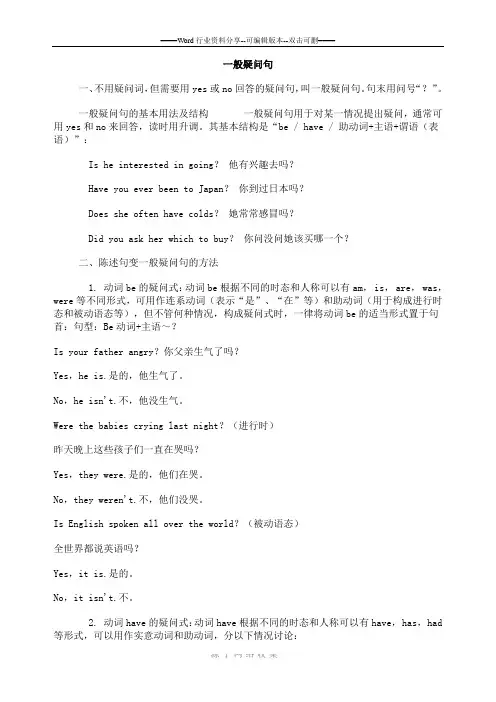
一般疑问句一、不用疑问词,但需要用yes或no回答的疑问句,叫一般疑问句。
句末用问号“?”。
一般疑问句的基本用法及结构一般疑问句用于对某一情况提出疑问,通常可用yes和no来回答,读时用升调。
其基本结构是“be / have / 助动词+主语+谓语(表语)”:Is he interested in going?他有兴趣去吗?Have you ever been to Japan?你到过日本吗?Does she often have colds?她常常感冒吗?Did you ask her which to buy?你问没问她该买哪一个?二、陈述句变一般疑问句的方法1. 动词be的疑问式:动词be根据不同的时态和人称可以有am, is, are, was,were等不同形式,可用作连系动词(表示“是”、“在”等)和助动词(用于构成进行时态和被动语态等),但不管何种情况,构成疑问式时,一律将动词be的适当形式置于句首:句型:Be动词+主语~?Is your father angry?你父亲生气了吗?Yes,he is.是的,他生气了。
No,he isn't.不,他没生气。
Were the babies crying last night?(进行时)昨天晚上这些孩子们一直在哭吗?Yes,they were.是的,他们在哭。
No,they weren't.不,他们没哭。
Is English spoken all over the world?(被动语态)全世界都说英语吗?Yes,it is.是的。
No,it isn't.不。
2. 动词have的疑问式:动词have根据不同的时态和人称可以有have, has, had 等形式,可以用作实意动词和助动词,分以下情况讨论:①用作实意动词表示状态,如表示拥有、患病或用于have to表示“必须”等,在构成构成式时可以直接将have, has, had置于句首,也可根据情况在句首使用do,does, did:Does he have [Has he] anything to say?他有什么话要说吗?Do you have [Have you] to leave so soon?你必须这么早走吗?Did you have [Had you] any friends then?他当时有朋友吗?②用作实意动词表示动作,如表示“吃(=eat)”、“喝(=drink)”、“拿(=take)”、“收到(=receive)”、“度过(=spend)”等,构成疑问式时不能将have提前至句首,而应在句首使用do, does, did:Does he have breakfast at home?他在家吃早餐吗?Did you have a good time at the party?你在晚会上玩得高兴吗?③完成时的一般疑问句句型:Have(Has)+主语+动词的过去分词+~?Have you known her since your childhood?你从童年就认识她吗?Yes,I have.是的。
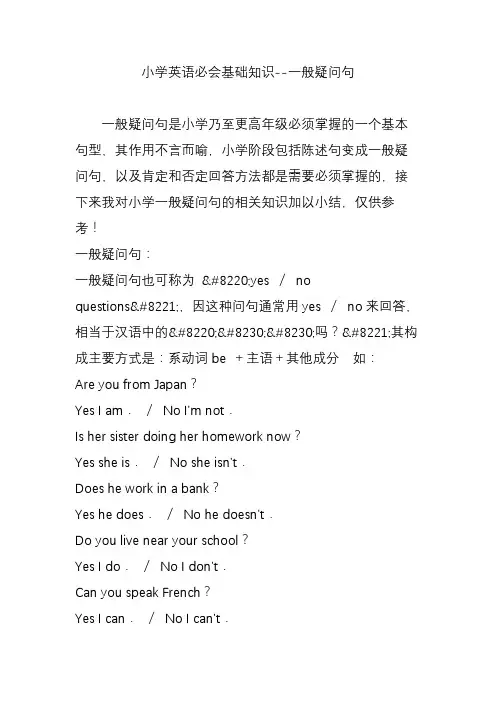
小学英语必会基础知识--一般疑问句一般疑问句是小学乃至更高年级必须掌握的一个基本句型,其作用不言而喻,小学阶段包括陈述句变成一般疑问句,以及肯定和否定回答方法都是需要必须掌握的,接下来我对小学一般疑问句的相关知识加以小结,仅供参考!一般疑问句:一般疑问句也可称为“yes /noquestions”,因这种问句通常用yes /no来回答,相当于汉语中的“……吗?”其构成主要方式是:系动词be +主语+其他成分如:Are you from Japan?Yes I am./No I'm not.Is her sister doing her homework now?Yes she is./No she isn't.Does he work in a bank?Yes he does./No he doesn't.Do you live near your school?Yes I do./No I don't.Can you speak French?Yes I can./No I can't.May I go home now?Yes you may./No you mustn't.1.将陈述句变为一般疑问句时,如句中有be 动词(am is are …)时,可直接将它们提至主语前。
如主语为第一人称,应将其改为第二人称。
例:I'm in Class 2Grade 1.→Are you in Class 2Grade 1?We're watching TV.→Are you watching TV?2.陈述句中有情态动词(can may must …)时,也可直接将它们提至主语前,即可成为一般疑问句。
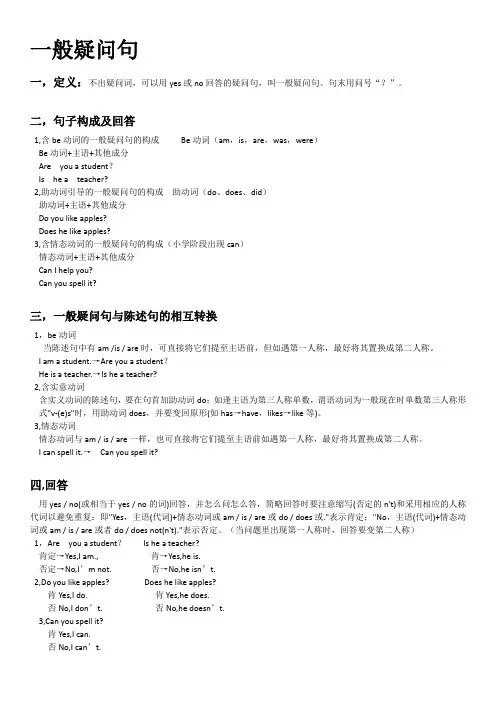
一般疑问句一,定义:不出疑问词,可以用yes或no回答的疑问句,叫一般疑问句。
句末用问号“?”。
二,句子构成及回答1,含be动词的一般疑问句的构成Be动词(am,is,are,was,were)Be动词+主语+其他成分Are you a student?Is he a teacher?2,助动词引导的一般疑问句的构成助动词(do、does、did)助动词+主语+其他成分Do you like apples?Does he like apples?3,含情态动词的一般疑问句的构成(小学阶段出现can)情态动词+主语+其他成分Can I help you?Can you spell it?三,一般疑问句与陈述句的相互转换1,be动词当陈述句中有am /is / are时,可直接将它们提至主语前,但如遇第一人称,最好将其置换成第二人称。
I am a student.→Are you a student?He is a teacher.→Is he a teacher?2,含实意动词含实义动词的陈述句,要在句首加助动词do;如逢主语为第三人称单数,谓语动词为一般现在时单数第三人称形式"v-(e)s"时,用助动词does,并要变回原形(如has→have,likes→like等)。
3,情态动词情态动词与am / is / are一样,也可直接将它们提至主语前如遇第一人称,最好将其置换成第二人称。
I can spell it.→Can you spell it?四,回答用yes / no(或相当于yes / no的词)回答,并怎么问怎么答,简略回答时要注意缩写(否定的n't)和采用相应的人称代词以避免重复:即"Yes,主语(代词)+情态动词或am / is / are或do / does或."表示肯定;"No,主语(代词)+情态动词或am / is / are或者do / does not(n't)."表示否定。
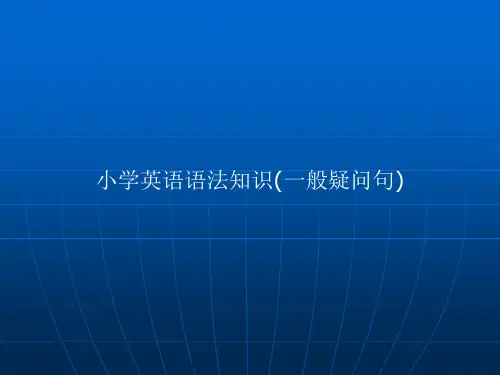
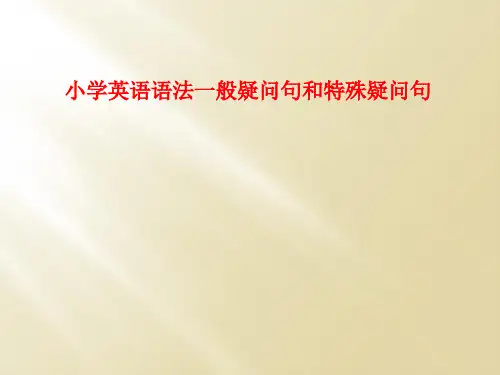
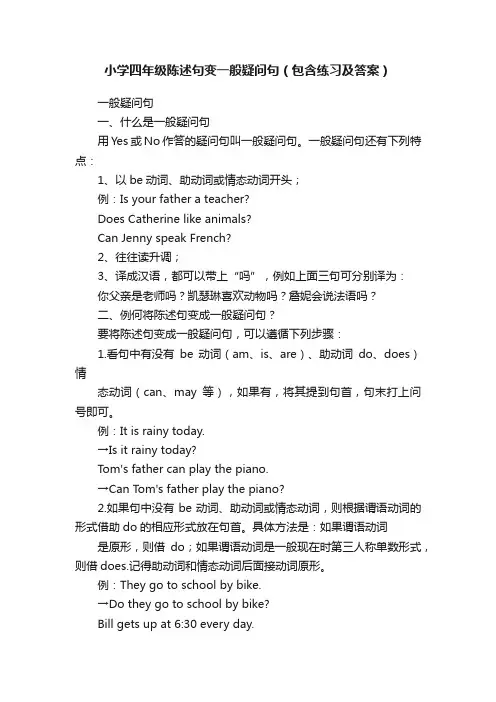
小学四年级陈述句变一般疑问句(包含练习及答案)一般疑问句一、什么是一般疑问句用Yes或No作答的疑问句叫一般疑问句。
一般疑问句还有下列特点:1、以be动词、助动词或情态动词开头;例:Is your father a teacher?Does Catherine like animals?Can Jenny speak French?2、往往读升调;3、译成汉语,都可以带上“吗”,例如上面三句可分别译为:你父亲是老师吗?凯瑟琳喜欢动物吗?詹妮会说法语吗?二、例何将陈述句变成一般疑问句?要将陈述句变成一般疑问句,可以遵循下列步骤:1.看句中有没有be动词(am、is、are)、助动词do、does)情态动词(can、may等),如果有,将其提到句首,句末打上问号即可。
例:It is rainy today.→Is it rainy today?Tom's father can play the piano.→Can Tom's father play the piano?2.如果句中没有be动词、助动词或情态动词,则根据谓语动词的形式借助do的相应形式放在句首。
具体方法是:如果谓语动词是原形,则借do;如果谓语动词是一般现在时第三人称单数形式,则借does.记得助动词和情态动词后面接动词原形。
例:They go to school by bike.→Do they go to school by bike?Bill gets up at 6:30 every day.→Does bill get up at 6:30 every day?三.陈述句变一般疑问句应注意的事项陈述句变成一般疑问句除了遵循上述规则以外,还应注意下列几点:1.如果陈述句中有第一人称,则变问句时最好要变为第二人称。
例:I usually have lunch at school.→Do you usually have lunch at school?My father is playing soccer.→Is your father playing soccer?2.如果陈述句中有some, 则变问句时往往要变成any 。
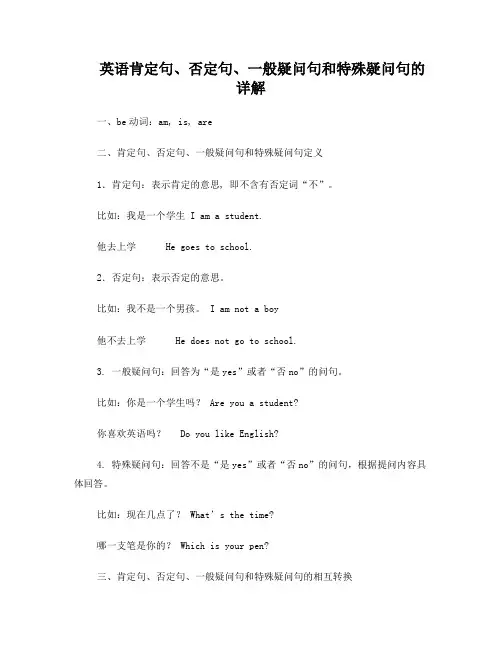
英语肯定句、否定句、一般疑问句和特殊疑问句的详解一、be动词:am, is, are二、肯定句、否定句、一般疑问句和特殊疑问句定义1.肯定句:表示肯定的意思, 即不含有否定词“不”。
比如:我是一个学生 I am a student.他去上学 He goes to school.2.否定句:表示否定的意思。
比如:我不是一个男孩。
I am not a boy他不去上学 He does not go to school.3. 一般疑问句:回答为“是yes”或者“否no”的问句。
比如:你是一个学生吗? Are you a student?你喜欢英语吗? Do you like English?4. 特殊疑问句:回答不是“是yes”或者“否no”的问句,根据提问内容具体回答。
比如:现在几点了?What’s the time?哪一支笔是你的? Which is your pen?三、肯定句、否定句、一般疑问句和特殊疑问句的相互转换有am, is, are的句子,肯定句变否定句:在am, is, are后面加上not,其余按顺序照抄。
肯定句变一般疑问句:把am, is, are提前放到句首并大写Am, Is, Are,其余照抄。
肯定句变特殊疑问句(就划线部分提问):分3步骤第一步:先变一般疑问句第二步:找合适的特殊疑问词代替划线部分第三步:特殊疑问词提前放到句首,并大写,其余按顺序照抄,省略划线部分。
注意:1.一定先变一般疑问句。
但是,如果问的是主语或主语的定语时,语序不变,为"特殊疑问词(+主语)+陈述句"。
如:Li ming 's not here today. Who's not here today? 今天谁没来?2.划线部分不能在特殊疑问句中出现。
when 什么时间(问时间)what date 什么日期问具体日期who 谁(问人)what place什么地点问具体地址whose 谁的问主人how …怎么样问情况where 在哪里问地点how old 多大问年龄which 哪一个问选择how many 多少问数量例如:1.肯定句、否定句和一般疑问句的互换肯定句:This is a book.否定句:This is not a book.一般疑问句:Is this a book?肯定回答:Yes, it is.否定回答:No, it isn’t.2.就划线部分提问(变特殊疑问句)This is a book.第一步:变一般疑问句 Is this a book?第二步:找合适的特殊疑问词 Is this what ?第三步:特殊疑问词提前放到句首,并大写,其余按顺序照抄,省略划线部分。
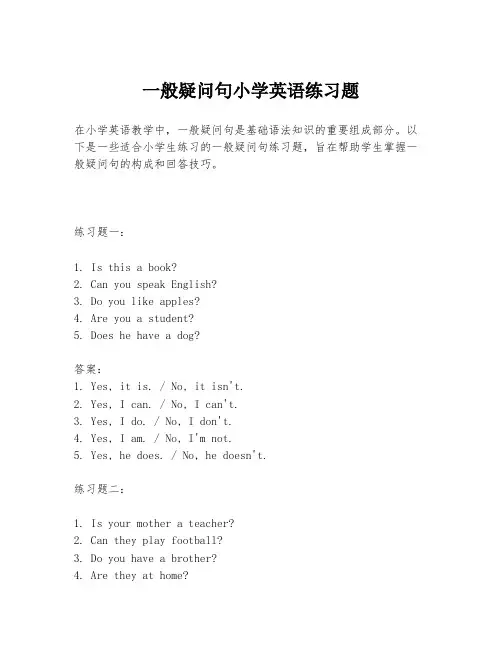
一般疑问句小学英语练习题在小学英语教学中,一般疑问句是基础语法知识的重要组成部分。
以下是一些适合小学生练习的一般疑问句练习题,旨在帮助学生掌握一般疑问句的构成和回答技巧。
练习题一:1. Is this a book?2. Can you speak English?3. Do you like apples?4. Are you a student?5. Does he have a dog?答案:1. Yes, it is. / No, it isn't.2. Yes, I can. / No, I can't.3. Yes, I do. / No, I don't.4. Yes, I am. / No, I'm not.5. Yes, he does. / No, he doesn't.练习题二:1. Is your mother a teacher?2. Can they play football?3. Do you have a brother?4. Are they at home?5. Does she live in China?答案:1. Yes, she is. / No, she isn't.2. Yes, they can. / No, they can't.3. Yes, I do. / No, I don't.4. Yes, they are. / No, they aren't.5. Yes, she does. / No, she doesn't. 练习题三:1. Is it raining?2. Can you swim?3. Do they have a cat?4. Are you hungry?5. Does he like music?答案:1. Yes, it is. / No, it isn't.2. Yes, I can. / No, I can't.3. Yes, they do. / No, they don't.4. Yes, I am. / No, I'm not.5. Yes, he does. / No, he doesn't. 练习题四:1. Is she your sister?2. Can he play the piano?3. Do you have a car?4. Are they in the classroom?5. Does she have long hair?答案:1. Yes, she is. / No, she isn't.2. Yes, he can. / No, he can't.3. Yes, I do. / No, I don't.4. Yes, they are. / No, they aren't.5. Yes, she does. / No, she doesn't.练习题五:1. Is he your friend?2. Can they dance?3. Do you like sports?4. Are you from Beijing?5. Does he have a bike?答案:1. Yes, he is. / No, he isn't.2. Yes, they can. / No, they can't.3. Yes, I do. / No, I don't.4. Yes, I am. / No, I'm not.5. Yes, he does. / No, he doesn't.通过这些练习题,学生可以加深对一般疑问句的理解,并且学会如何正确地构造和回答一般疑问句。
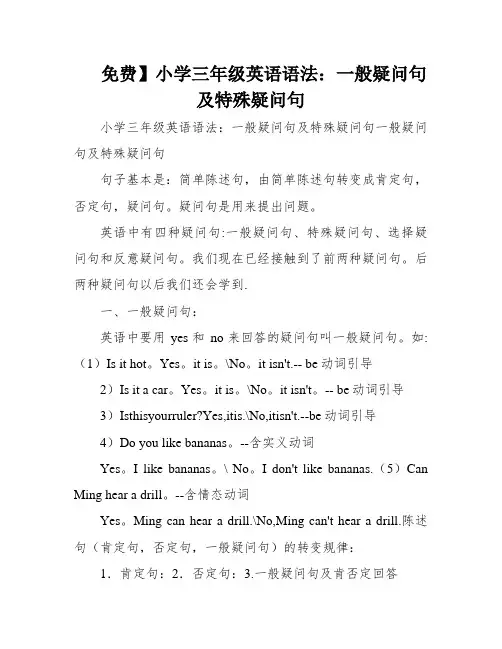
免费】小学三年级英语语法:一般疑问句及特殊疑问句小学三年级英语语法:一般疑问句及特殊疑问句一般疑问句及特殊疑问句句子基本是:简单陈述句,由简单陈述句转变成肯定句,否定句,疑问句。
疑问句是用来提出问题。
英语中有四种疑问句:一般疑问句、特殊疑问句、选择疑问句和反意疑问句。
我们现在已经接触到了前两种疑问句。
后两种疑问句以后我们还会学到.一、一般疑问句:英语中要用yes和no来回答的疑问句叫一般疑问句。
如:(1)Is it hot。
Yes。
it is。
\No。
it isn't.-- be动词引导2)Is it a car。
Yes。
it is。
\No。
it isn't。
-- be动词引导3)Isthisyourruler?Yes,itis.\No,itisn't.--be动词引导4)Do you like bananas。
--含实义动词Yes。
I like bananas。
\ No。
I don't like bananas.(5)Can Ming hear a drill。
--含情态动词Yes。
Ming can hear a drill.\No,Ming can't hear a drill.陈述句(肯定句,否定句,一般疑问句)的转变规律:1.肯定句:2.否定句:3.一般疑问句及肯否定回答主语+be动词+….主语+be动词+not+….be动词+主语+…?Yes,主语+be动词./No,主语+be动词+not.I am XXX?Yes。
I am./ No。
I am not. XXX?Yes。
she is./ No。
she isn't. XXX insects?Yes。
they are./ No。
they aren't. 主语+神态动词can+…主语+情态动词can+ no t+….神态动词can+主语+…?Yes,主语+神态动词can/No,主语+情态动词can+ not He can jump.Hecannot/can'tjump.Can he jump?Yes,he can./ No。
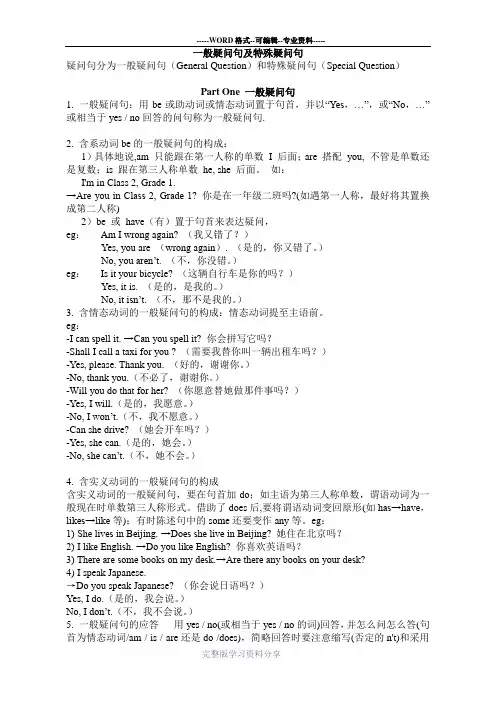
一般疑问句及特殊疑问句疑问句分为一般疑问句(General Question)和特殊疑问句(Special Question)Part One 一般疑问句1. 一般疑问句:用be或助动词或情态动词置于句首,并以“Yes,…”,或“No,…”或相当于yes / no回答的问句称为一般疑问句.2. 含系动词be的一般疑问句的构成:1)具体地说,am 只能跟在第一人称的单数I 后面;are 搭配you, 不管是单数还是复数;is 跟在第三人称单数he, she 后面。
如:I'm in Class 2, Grade 1.→Are you in Class 2, Grade 1? 你是在一年级二班吗?(如遇第一人称,最好将其置换成第二人称)2)be 或have(有)置于句首来表达疑问,eg:Am I wrong again? (我又错了?)Yes, you are (wrong again). (是的,你又错了。
)No, you aren’t. (不,你没错。
)eg:Is it your bicycle? (这辆自行车是你的吗?)Yes, it is. (是的,是我的。
)No, it isn’t. (不,那不是我的。
)3. 含情态动词的一般疑问句的构成:情态动词提至主语前。
eg:-I can spell it. →Can you spell it? 你会拼写它吗?-Shall I call a taxi for you ? (需要我替你叫一辆出租车吗?)-Yes, please. Thank you. (好的,谢谢你。
)-No, thank you.(不必了,谢谢你。
)-Will you do that for her? (你愿意替她做那件事吗?)-Yes, I will.(是的,我愿意。
)-No, I won’t.(不,我不愿意。
)-Can she drive? (她会开车吗?)-Yes, she can.(是的,她会。
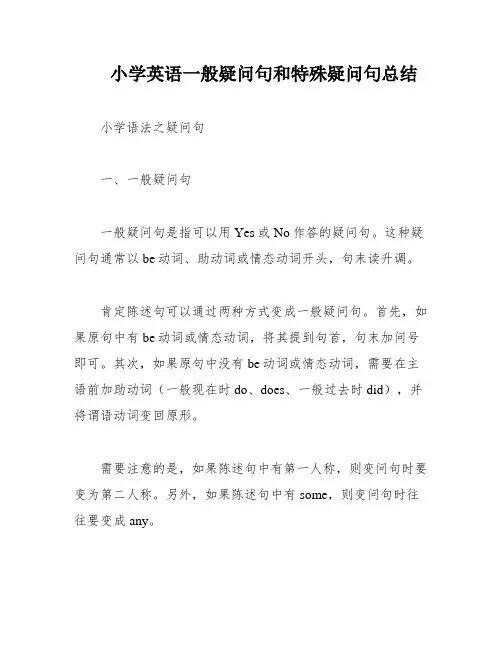
小学英语一般疑问句和特殊疑问句总结小学语法之疑问句一、一般疑问句一般疑问句是指可以用Yes或No作答的疑问句。
这种疑问句通常以be动词、助动词或情态动词开头,句末读升调。
肯定陈述句可以通过两种方式变成一般疑问句。
首先,如果原句中有be动词或情态动词,将其提到句首,句末加问号即可。
其次,如果原句中没有be动词或情态动词,需要在主语前加助动词(一般现在时do、does、一般过去时did),并将谓语动词变回原形。
需要注意的是,如果陈述句中有第一人称,则变问句时要变为第二人称。
另外,如果陈述句中有some,则变问句时往往要变成any。
一般疑问句的回答可以用Yes或No,并在主语后加上相应的be动词、助动词或情态动词。
如果回答是否定的,则需要在be动词、助动词或情态动词后面加上not的否定形式缩写。
Can she dance。
Yes。
she can.When asked if she can dance。
XXX。
If the subject of the n is "this" or "that"。
the answer should use "it" instead。
If the subject is "these" or "those"。
the answer should use "they" instead.Is this your bag?Yes。
it is。
/ No。
it isn't.Are those your books?Yes。
they are。
/ No。
they aren't.Practice:1.What did his father do for a living?2.Why are these cats crying?3.Who can swim?4.How did you go to school?5.How does his XXX work?6.Can Mrs。
一般疑问句的讲解及练习一、什么是一般疑问句?以Be动词〔am is are〕,助动词〔do / does/ did / have/has〕,情态动词〔can/must/should〕开头的句子,而且用Yes或No来答复,读升调的句子就是一般疑问句。
译成汉语,都可以带上“吗〞,例如上面三句可分别译为:例:1〕Is your father a teacher? 你父亲是老师吗?2〕Catherine like animals? 凯瑟琳喜欢动物吗?3〕Jenny speak French? 詹妮会说法语吗?二、由陈述句变一般疑问句的规则:①第一步“找〞,看看句中有没有be动词〔am/is/are〕,助动词〔do/does/have/has〕,情态动词〔can/must/should〕这些词,如果有,就直接将这些词放在句子的开头,句末打上问号。
1〕找be动词〔am/is/are〕,如果有be动词,就把be 动词提到句子的第一位,其它局部照抄,把最后的句号变成问号。
②注意人称的变化:一变二,二变一,三不变,some变成any把句子的“我I〞换成〞你’you“我们we换成你们you我的my换成你们your我们的our换成你们的your〞some变成any③注意第一个首字母要大写,句子末尾的“句号.〞换成“问号?〞■由be动词引导的一般疑问句Be(am/is/are)+主语+其它+?肯定答复:Yes,主语代词+Be动词+句号否认答复:No,主语代词+be动词+not.例如:It is rainy today.→Is it rainy today?■由情态动词引导的一般疑问句:情态动词+主语+动词原形+其它+?〔1〕肯定答复:Yes,主语代词+情态动词+句点〔2〕否认答复:No,主语代词+情态动词+ not . 口诀:一提二换三照抄一提:将情态动词提到句子开头;二换:将第一人称换成第二人称;三照抄:陈述句剩下的都照抄例句:①Can you swim?Yes, I cna./No, I can not. ②Should I walk in the road?No, you should not.③We can playfootball.变成一般疑问句:Can you play football?④Tom's father can play the piano.→Can Tom's father play the piano?■如果句中有没有be动词〔am is are〕,助动词〔do does have has〕,情态动词〔can〕,则依据谓语动词的形式借助do 或does放句首。
小学英语肯定句、否定句、一般疑问句和特殊疑问句的详解一、be动词:am, is, are二、肯定句、否定句、一般疑问句和特殊疑问句定义1.肯定句:表示肯定的意思, 即不含有否定词“不”。
比如:我是一个学生I am a student.他去上学He goes to school.2.否定句:表示否定的意思。
比如:我不是一个男孩。
I am not a boy他不去上学He does not go to school.3. 一般疑问句:回答为“是yes”或者“否no”的问句。
比如:你是一个学生吗?Are you a student?你喜欢英语吗?Do you like English?4. 特殊疑问句:回答不是“是yes”或者“否no”的问句,根据提问内容具体回答。
比如:现在几点了?What’s the time?哪一支笔是你的?Which is your pen?三、肯定句、否定句、一般疑问句和特殊疑问句的相互转换肯定句变否定句:在am, is, are后面加上not,其余按顺序照抄。
am, is, are提前放到句首并大写Am, Is, Are,其余照抄。
肯定句变特殊疑问句(就划线部分提问):分3步骤第一步:先变一般疑问句第二步:找合适的特殊疑问词代替划线部分第三步:特殊疑问词提前放到句首,并大写,其余按顺序照抄,省略划线部分。
注意:1.如:Li ming 's not here today. Who's not here today? 今天谁没来?2.划线部分不能在特殊疑问句中出现。
例如:1.肯定句、否定句和一般疑问句的互换肯定句:This is a book.否定句:一般疑问句:Is this a book?肯定回答:Yes, it is.否定回答:No, it isn’t.2.就划线部分提问(变特殊疑问句)This is a book.第一步:变一般疑问句Is this a book?第二步:找合适的特殊疑问词Is this what ?第三步:特殊疑问词提前放到句首,并大写,其余按顺序照抄,省略划线部分。
小学一般疑问句练习题及答案1. 概念能用yes / no回答的问句叫一般疑问句。
2. 含系动词be的一般疑问句的构成具体地说,就是当陈述句中有am /is / are时,可直接将它们提至主语前,但如遇第一人称,最好将其置换成第二人称。
如:I'm in Class, Grade 1. →Are you in Class, Grade 1? 你是在一年级二班吗?3. 含情态动词的一般疑问句的构成一般疑问句面前人人平等:情态动词与am / is / are 一样,也可直接将它们提至主语前,所以问题迎刃而解了。
如:I can spell it. →Can you spell it? 你会拼写它吗?4. 含实义动词的一般疑问句的构成含实义动词的一般疑问句的构成稍微有点讲究,要在句首加do;如逢主语为第三人称单数,谓语动词为一般现在时单数第三人称形式"v-s"时,奉does为座上宾并要变回原形;有时陈述句中的some还要变作any等。
如:She lives in Beijing. →Does she live in Beijing? 她住在北京吗?I like English. →Do you like English? 你喜欢英语吗?There are some books on my desk.→Are there any books on your desk?5. 少数口语化的一般疑问句如问一个与前文相同的问句时,可省略成"And you?"或"What / How about...?"等;甚至只抓关键词,读作升调。
如:Your pen? 你的钢笔?6. 小插曲:一般疑问句的语调大部分的一般疑问句都应读作升调,并落在最后一个单词身上。
如:Is it a Chinese car↗?7. 一般疑问句的应答用yes / no回答,并怎么问怎么答,简略回答时要注意缩写和采用相应的人称代词以避免重复:即"Yes,主语+情态动词或am / is / are或do / does."表示肯定;"No,主语+情态动词或am / is / are或者do / does not."表示否定。
一般疑问句1. 一般疑问句里有be(am, is, are)动词的:陈述句改为疑问句时,原则是:原句子里有什么动词(如be动词),就把什么动词(be动词)提前,其它照搬下来变为疑问句。
在对疑问句做肯定或否定回答时,原则是:用什么提问,就用什么回答。
如用be动词提问,就用be动词回答.肯定句、否定句和一般疑问句的互换。
(1)如果句中有this/those/these,在做肯定否定回答时要变为it (单数)或 they(复数)。
如:肯定句:This is a book. These/Those are banana trees。
否定句一般疑问句:Is this a book? Are these/those banana trees?肯定回答:Yes, it is。
Yes, they are。
否定回答:No, it isn’t. No, they aren't.(2)如果句中有第三人出现时,在变为疑问句时,my 要变为your, I 要变为you。
做肯定否定回答时要用he/she(单数)或 they (复数)。
肯定句:This is my new teacher。
They are students in No。
1 Middle School.否定句:This is n’t my teacher。
They are not students in No。
1 Middle School。
一般疑问句:Is this your new teacher? Are they students in No。
1 Middle School?肯定回答: yes, he/she is。
Yes, they are否定回答: No,he/she isn’t。
No, they aren’t。
肯定句:There is a desk in the room. It is a map.否定句:There isn’t a desk in the room。
一般疑问句一、什么是一般疑问句1、用Yes或No作答的疑问句叫一般疑问句。
2、译成汉语,都可以带上“吗”,例如:你父亲是老师吗?凯瑟琳喜欢动物吗?詹妮会说法语吗?二、例何将陈述句变成一般疑问句?要将陈述句变成一般疑问句,可以遵循下列步骤:1句中有没有be动词(am、is、 are、 was、 were)、情态动词(can、must、will、may等),如果有,将其提到句首即可。
It was rainy yesterday.Was it rainy yesterday?Tom's father can play the piano.Can Tom's father play the piano?She is a student.Is she a student?2. 如果句中没有be动词、情态动词,则根据谓语动词的形式借助do的相应形式放在句首。
They go to school by bike. (动词原形)Do they go to school by bike?Bill gets up at 6:30 every day. (第三人称单数)Does bill gets up at 6:30 every day?The students saw a film yesterday. (过去式)Did the students see a film yesterday?三.陈述句变一般疑问句应注意的事项1.如果陈述句中有第一人称,则变问句时最好要变为第二人称。
I usually have lunch at school.Do you usually have lunch at school?2.如果陈述句中有some, 则变否定句或者疑问句时往往要变成any 。
There is some water on the playground.Is there any water on the playground?四.一般疑问句的回答一般疑问句往往采用简短回答,共由三部分(三个单词)组成:1.第一个词:不是Yes就是No。
2.第二个词:问谁答谁。
即答语中的主语须与问句的主语一致Does she clean her room every day?Yes, she does.Is Anna′s father a doctor?No,he isn′t.3.第三个词:用什么问,用什么答。
即沿用问句中的引导词。
Can Jim play soccer?Yes, he can.Does Mr Bean speak English?Yes, he does.4.用No开头作否定回答时,结尾要加上 not。
例:Did Thomas come here yesterday?No ,he didn′tIs Lin Lin in Class 3?No, she isn′t.或(No, she′s not)特殊疑问句以疑问词开头,对句中某一成分提问的句子叫特殊疑问句。
特殊疑问句=特殊疑问词+一般疑问句常用的疑问词有:如何把陈述句变成特殊疑问句?就划线部分提问:肯定句变特殊疑问句(就划线部分提问):分3步骤第一步:先变一般疑问句第二步:找合适的特殊疑问词代替划线部分第三步:特殊疑问词提前放到句首,并大写,其余按顺序照抄,省略划线部分。
例子:特殊疑问句的回答:回答特殊疑问句时,不能用yes / no,即问什么答什么,尤其是简略回答。
如:Who is from Canada﹖(who问谁)Helen (is).Where's the restaurant﹖(where问地点)Near the station.Why do you like koalas﹖(why问原因)Because they are cute.一般疑问句&特殊疑问句练习一、将以下句子改为一般疑问句.1. His father is an English teacher.2. These cats are crying.3. They can swim.4. I like to read English.5. I go to school on foot.6. He likes English.7. His father goes to work by bus.8. He is crying under the tree.9. His birthday is on the twentieth of November.10. Mrs. Li and Kitty are in a big shop.11. Kitty is wearing her new uniform.12. The boy under the tree is hungry.13. He goes to school every day.15. I want to have a model car.16. She wants a cup of coffee.17. Mrs. Li and Kitty watch television at night.18. I do my homework after school二、选择正确的单词填空(who, where, when)1._____ is that pretty girl? She is my sister.2._____ are Jack and Tom? They are behind you.3._____ do you go to school? I go to school from Monday to Friday.4._____ has a beautiful flower? John has a beautiful flower.5._____ are they? They are my parents.6._____ is my mother? She is in the living room.7._____ are you going? We are going to the bakery(面包坊).8._____ do Jim and Wendy play ball? They play ball in the afternoon.9._____ does he jog? He jogs in the park.10._____ are you from? I'm from Changchun city.三、就画线部分提问1.He is my father.2.They are under the tree.3.I often watch TV after dinner.(晚饭后) 提示:饭后强调的是时间问题。
4.Lily swims in the swimming pool.(游泳池)5.Superman flies in the sky.6.I often brush my teeth in the evening.7.Alan likes to play with Bill.8.Joe's father plays badminton(羽毛球) every weekend.9.The supermarket is near the school.10.The laptop(笔记本电脑) is on the table.11.Jennifer has a pair of earrings(耳环).12.The flowers are in the flower pot(花盆).13.My grandpa took us to the zoo.14.I put the gold fish(金鱼) into the fish tank(鱼缸).15.The monkey sleeps at night.四.用what time, what color, what day, what填空。
1. A: ______ _______ is it? B: It is nine o’clock.2. A: ______ _______ does your mother get up? B: My mother gets up at 6:30.3. A: ______ _______ do you go to bed? B: I go to bed at 10:00.4. A: ______ _______ do Diana and Fiona have supper?B: Diana and Fiona have supper at 18:00.5. A: ______ _______is it? B: It is purple.6. A: ______ _______ is the sky? B: The sky is blue.7. A: ______ _______ is your coat? B: My coat is black.8. A: ______ _______ is the dog? B: The dog is white.9. A: ______ _______ is today? B: Today is Monday.10. A: ______ _______ is tomorrow? B: Tomorrow is Tuesday.11. A: ______ _______ was yesterday(昨天)? B: Yesterday was Sunday.12. A: ______ _______ do you like? B: I like red.13. A: ______ is this? This is a computer(电脑).14. A: ______ are you doing? B: We are playing basketball.15. A: ______ does your mother do? B: My mother is a policewoman.16. A: ______ are those? B: Those are peppers(辣椒).17. A: ______ is in the box? B: A lovely doll is in the box.18. A: ______ is on the table? B: The apple is on the table.19. A: ______ is in the classroom? The blackboard is in the classroom.20. A: ______ ______ ______? B: Mary is hungry.五.连线:(Match)1. What’s on the chair? A There is a book in the bag.2. How is your father? B These are apples.3. What are these? C I go to school by bus.4. What is in the bag? D The radio is on the chair.5. How do you go to school? E My father is fine.6. How much is it? F I wash my face in the morning.7. What time is it? G I have two hands.8. When do you wash your face? H It is four o’clock.9. How many hands do you have? I It is 5 RMB(人民币).10.When do you have lunch? J I have lunch at noon.课后练习:一.把以下句子改成一般疑问句1. His father was an English teacher.2. These cats are crying.3. They can swim.4. I went to school on foot.5. His father goes to work by bus.6. Mrs. Li and Kitty can sing English songs..7. Kitty is wearing her new uniform.8. The two boys under the tree were hungry.9. Mrs. Li and Kitty watch television at night.10. I can finish my homework by myself.11. I have some good friends.12. They cleaned their rooms and finished their homework yesterday.。